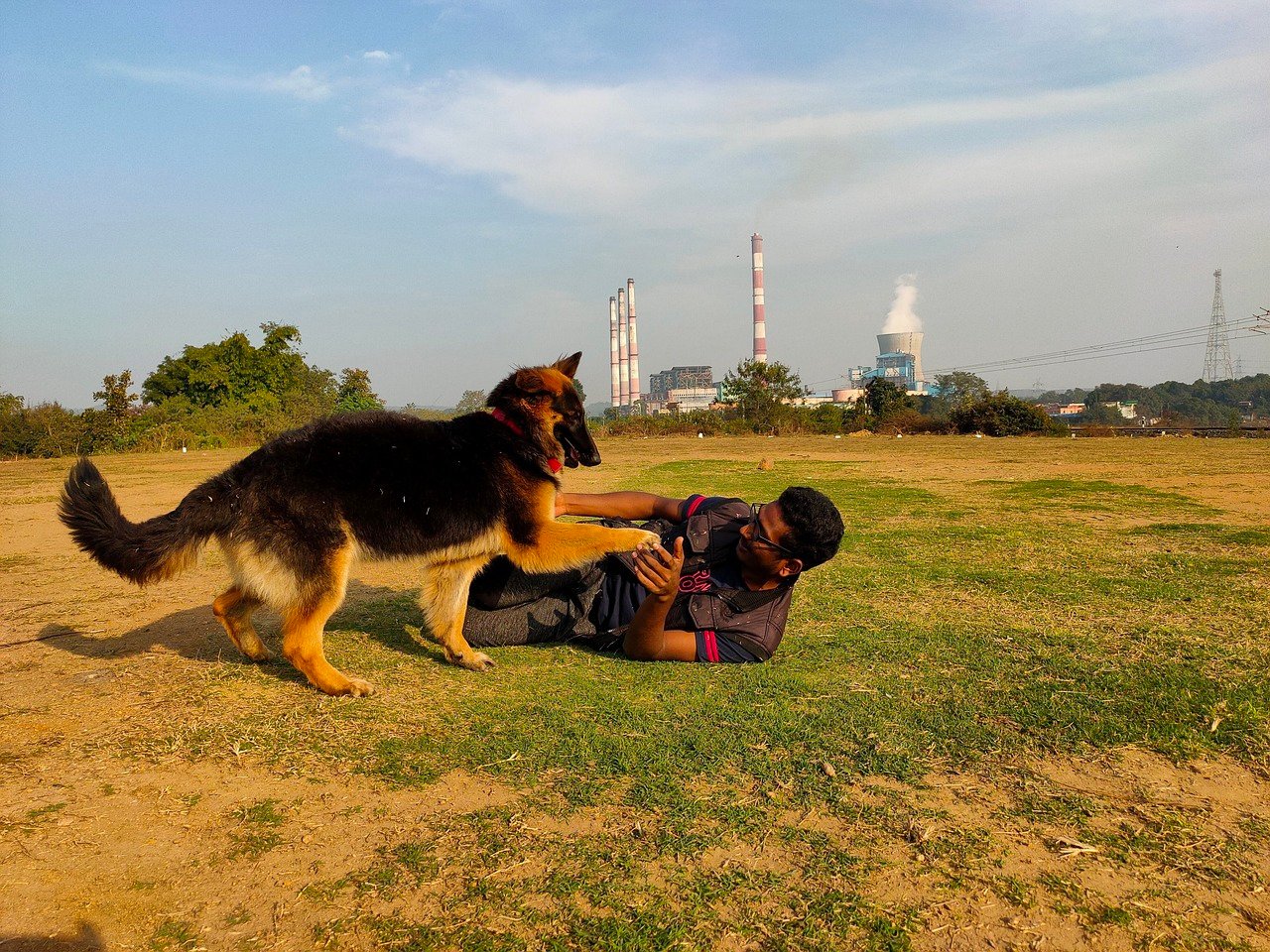So, you’ve just brought home your adorable German Shepherd puppy and you couldn’t be more excited. But now you find yourself wondering, when is the right time to start obedience training? Well, fear not, because in this article, we’ll explore the ideal age to begin training your German Shepherd puppy, ensuring a strong foundation for a well-behaved and well-rounded furry friend. Whether you’re a new puppy parent or experienced in training dogs, this guide will provide you with valuable insights to get started on your training journey. So grab a treat, gather your pup, and let’s embark on this exciting adventure together!

This image is property of pixabay.com.
The Importance of Obedience Training
Obedience training is a crucial aspect of owning a German Shepherd puppy. Not only does it help create a strong bond between you and your furry friend, but it also ensures their safety and allows you to have better control over their actions. Additionally, obedience training promotes good behavior, making your German Shepherd a well-mannered and well-behaved member of society.
Creating a Strong Bond
Obedience training serves as a foundation for building a strong bond with your German Shepherd puppy. Through training, you establish trust and communication, which are essential for a healthy relationship. When you train your puppy, you spend quality time together, strengthening the bond and deepening the connection between you. This bond will not only enhance your relationship but also make future training sessions more effective.
Ensuring Safety and Control
German Shepherds are known for their intelligence, strength, and protectiveness. Without proper obedience training, these traits can lead to undesirable behaviors that may compromise their safety and the safety of others. By teaching your puppy obedience commands, such as sit, stay, and recall, you can ensure that they listen to your commands in potentially dangerous situations. This level of control is crucial for their safety, as well as the safety of others around them.
Promoting Good Behavior
One of the key benefits of obedience training is the promotion of good behavior in your German Shepherd puppy. Through consistent training, you can establish routines, boundaries, and expectations that guide your puppy’s behavior. This not only helps prevent common behavioral issues, such as jumping, excessive barking, and aggression but also encourages positive behaviors, such as walking nicely on a leash, interacting politely with other dogs, and being calm in various environments. Obedience training sets the foundation for a well-behaved and socially adept German Shepherd.
Developmental Stages of a German Shepherd Puppy
German Shepherd puppies go through several developmental stages as they grow and mature. Understanding these stages can help you tailor your obedience training approach to best suit your puppy’s needs.
The Neonatal Stage
The neonatal stage starts from birth and lasts for approximately two weeks. During this stage, German Shepherd puppies are highly dependent on their mother and littermates for nourishment and warmth. They are unable to see or hear, and their senses are still developing. It is not recommended to start formal obedience training during this stage, as the puppies are still focusing on their physical development and bonding with their mother.
The Transitional Stage
The transitional stage occurs between weeks two and four of a German Shepherd puppy’s life. During this stage, the puppies begin to open their eyes and ears, and they become more aware of their surroundings. Their motor skills improve, and they start to interact with their littermates and explore their environment. Although formal obedience training is not typically started during this period, this is an excellent time to start gentle socialization and positive reinforcement training techniques.
The Socialization Stage
The socialization stage usually occurs between weeks four and twelve of a German Shepherd puppy’s life. This is a critical period when their brains are highly receptive to learning and social experiences. It is during this stage that formal obedience training can be introduced. Positive reinforcement techniques and exposure to various environments, people, and animals help them develop into well-rounded and confident adult dogs. Introducing obedience commands gradually and consistently during this stage sets a solid foundation for their future training.
The Juvenile Stage
The juvenile stage typically starts around three months and lasts until the puppy reaches sexual maturity, which is usually between six and fifteen months. During this stage, your German Shepherd puppy’s energy levels may increase, and they may exhibit some challenging behaviors. It is crucial to continue their obedience training during this period to reinforce their previous learning and to address any behavioral issues that may arise. Consistency and patience are key during the juvenile stage to ensure a smooth transition into adulthood.
The Adolescent Stage
The adolescent stage occurs after sexual maturity and can last up to two years in German Shepherd puppies. This stage is characterized by hormonal changes, increased independence, and a continuation of testy behaviors. It is important to remain consistent with your obedience training and provide clear boundaries during this period. Reinforcing previous training and addressing any lingering behavioral issues will help your German Shepherd puppy mature into a well-behaved adult.
Ideal Timing for Obedience Training
Obedience training for German Shepherd puppies should be approached in different stages to ensure effective learning and development. The following are the ideal times to focus on specific aspects of obedience training.
Early Socialization and Foundation Training
Early socialization and foundation training should start as soon as you bring your German Shepherd puppy home. This includes introducing them to different people, environments, surfaces, and experiences. Additionally, basic commands such as sit, stay, and come should be introduced using positive reinforcement techniques. The period between weeks four and twelve is considered ideal for this stage of training.
Basic Obedience Training
Basic obedience training should be continued and further developed between three to six months of age. Building upon the foundation training, you can begin teaching more advanced commands and behaviors, such as heel, down, and leave it. Consistency, repetition, and positive reinforcement are essential during this stage to establish reliable obedience responses.
Specialized Training
Once your German Shepherd puppy has mastered the basics, you can consider specialized training tailored to their individual needs or interests. Specialized training can include activities such as agility, search and rescue, and scent training. This training helps channel their energy, stimulates their minds, and strengthens the bond between you and your furry companion.
Factors to Consider in Training Readiness
Before embarking on obedience training with your German Shepherd puppy, it is essential to consider their readiness in terms of physical, cognitive, and emotional development.
Physical Readiness
Your German Shepherd puppy should be physically capable of participating in obedience training. They should have developed sufficient strength, coordination, and stamina to perform the required exercises and commands. Pay attention to their growth and consult with your veterinarian to ensure your puppy is physically ready for training.
Cognitive Readiness
Cognitive readiness refers to your puppy’s ability to understand and learn new commands and behaviors. During the socialization stage, their brains are highly receptive to learning, making it an ideal time to introduce obedience training. As they mature, their cognitive abilities develop further, allowing for more complex training tasks.
Emotional Readiness
Emotional readiness is equally important when it comes to obedience training. Your German Shepherd puppy should be emotionally stable and ready to handle the challenges that come with training. Ensure their trust and confidence are built through positive reinforcement techniques before moving on to more advanced training methods.

This image is property of pixabay.com.
Training Techniques for German Shepherd Puppies
German Shepherd puppies respond well to positive reinforcement training techniques. These techniques focus on rewarding desired behaviors rather than punishing unwanted ones. The following training methods are effective in teaching your puppy obedience commands.
Positive Reinforcement
Positive reinforcement involves rewarding your German Shepherd puppy for displaying desired behaviors. This can be done through treats, verbal praise, or playtime. By associating rewards with specific commands, your puppy learns that displaying the desired behavior leads to a positive outcome. This method creates a positive association with training and increases motivation to learn.
Marker Training
Marker training involves using a distinct sound or action, such as a clicker or a specific word, to mark the desired behavior at the precise moment it occurs. This helps your German Shepherd understand exactly which behavior is being rewarded. Marker training provides clear communication and allows for precise timing in reinforcing good behaviors.
Clicker Training
Clicker training is a specific form of marker training that utilizes a handheld device called a clicker. The clicker emits a unique sound that marks the desired behavior. Clicker training is particularly effective for German Shepherd puppies as it offers a precise and consistent marker for their actions.
Consistency and Patience
Consistency and patience are key elements in any obedience training program. German Shepherd puppies thrive in environments with clear and consistent expectations. It is important to use the same commands, hand signals, and training techniques consistently to avoid confusion. Additionally, patience is necessary as your puppy learns and processes information at their own pace.
Common Training Challenges and Tips
Training German Shepherd puppies comes with its fair share of challenges. However, with some patience and perseverance, these challenges can be overcome. Here are some common training challenges and tips to help you navigate through them.
Puppy Distractions
German Shepherd puppies can easily become distracted, especially during training sessions. Their curiosity and high energy levels may cause them to lose focus and engage in other activities. To combat this challenge, find a quiet and distraction-free environment for training. Gradually increase the level of distractions as your puppy becomes better at focusing on you.
Housebreaking
Housebreaking is an essential aspect of obedience training. German Shepherd puppies need to learn where to eliminate and develop good bathroom habits. Establish a consistent routine for bathroom breaks, reward your puppy for eliminating in the designated area, and supervise them closely in the house to prevent accidents. Consistency and positive reinforcement play a vital role in successful housebreaking.
Biting and Nipping
During the teething stage, German Shepherd puppies often exhibit biting and nipping behaviors. It is important to address this issue early on to prevent it from becoming a habit. Provide appropriate chew toys, redirect their attention when they start biting, and discourage biting with a firm “no” and withdrawal of attention. Consistency and patient guidance will teach your puppy proper bite inhibition.
Leash Training
Leash training is crucial for German Shepherds to ensure their safety and control during walks. Start by introducing your puppy to a collar or harness and gradually introduce the leash. Use positive reinforcement techniques to reward your puppy for walking calmly on the leash and correct any pulling behavior gently. Consistent and patient training will help your German Shepherd become a well-behaved walking companion.
Separation Anxiety
German Shepherd puppies often form strong bonds with their owners and may experience separation anxiety when left alone. To address this challenge, gradually introduce alone time by leaving your puppy for short periods and gradually increasing the duration. Provide them with engaging toys and establish a pre-departure routine to make the transition smoother. Seek professional help if separation anxiety persists.
Professional Training vs. DIY Training
When it comes to obedience training for German Shepherd puppies, you have two main options: professional training or DIY training. Both approaches have their benefits, and the decision ultimately depends on your preferences and the specific needs of your puppy.
Benefits of Professional Training
Professional training offers the expertise and guidance of experienced trainers. Trainers can assess your puppy’s individual needs, provide personalized training plans, and address specific behavioral issues. Professional training programs often provide a structured curriculum and group socialization opportunities. Additionally, trainers can offer ongoing support and advice, ensuring continued success and progress.
Benefits of DIY Training
DIY training allows you to train your German Shepherd puppy at your own pace and in a familiar environment. It can be a cost-effective option, as you do not have to invest in professional training programs. DIY training also strengthens the bond between you and your puppy, as you are personally involved in their learning and development. Many resources, such as books, online tutorials, and training classes, are available to assist you in successfully training your puppy yourself.
Choosing a Training Method
When choosing a training method for your German Shepherd puppy, it is crucial to consider their individual temperament and your training goals. The following are some commonly used training methods:
Reward-Based Training
Reward-based training focuses on positive reinforcement, using treats, praise, and play as rewards for good behavior. This method is highly effective and strengthens the bond between you and your puppy. It encourages your German Shepherd to make positive associations with training and to willingly comply with commands. Reward-based training is gentle and respects your puppy’s emotional well-being.
Balanced Training
Balanced training combines positive reinforcement techniques with mild corrections when necessary. This method emphasizes clear communication, consistency, and establishing boundaries. Balanced training can be effective for German Shepherds that require a more structured and disciplined approach. It is important to use corrections sparingly and appropriately to avoid causing fear or aggression in your puppy.
Force-Free Training
Force-free training, also known as positive-only training, focuses solely on positive reinforcement techniques. This method avoids any form of punishment or coercion and relies on rewarding desired behaviors. Force-free training is particularly beneficial for German Shepherds that are sensitive or have a more fearful temperament. It creates a safe and trusting environment for your puppy to learn and grow.
Training Considerations for Older German Shepherds
Obedience training is not limited to German Shepherd puppies. Older German Shepherds also benefit from continued training and mental stimulation throughout their lives. However, training older dogs comes with some unique considerations.
Behavioral Challenges
Some older German Shepherds may have existing behavioral challenges that require specific training approaches. This could include fear-based aggression, separation anxiety, or reactivity towards other dogs. If your older German Shepherd displays any concerning behaviors, it is advisable to consult with a professional trainer who specializes in behavior modification to address these challenges effectively.
Adapting Training Methods
When training older German Shepherds, it is important to consider their physical limitations and any age-related health concerns. Adapt training exercises to accommodate their comfort levels and adjust the intensity and duration of training sessions accordingly. Older dogs may also take longer to learn new commands or behaviors, so patience and consistency are essential.
Health and Physical Limitations
Older German Shepherds may have age-related health issues or physical limitations that need to be taken into account during obedience training. Regular exercise, a well-balanced diet, and regular veterinarian check-ups are crucial for maintaining their overall health. Be mindful of any physical discomfort or pain your dog may experience during training and make any necessary modifications or accommodations.
Conclusion
Obedience training plays a vital role in the development and well-being of your German Shepherd puppy. It strengthens the bond between you and your furry friend, ensures their safety and control, and promotes good behavior. By understanding the developmental stages of your puppy, considering their readiness for training, and utilizing effective training techniques, you can set them up for a happy and well-behaved life. Whether you choose professional training or opt for a DIY approach, the ultimate goal is to provide your German Shepherd with the necessary skills and guidance to be a confident and obedient companion. So start early, be patient, and enjoy the journey of training your amazing German Shepherd puppy.

